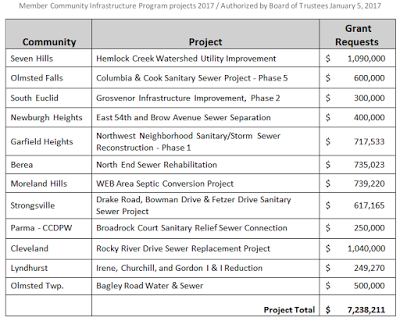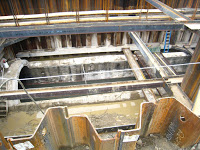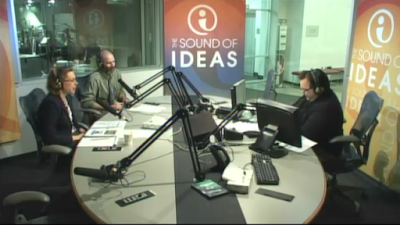
NEWS: $7.2 million to improve water quality by supporting local infrastructure investments
Posted by Jared Shepherd
- 5067 Views
- January 18th, 2017
- in Miscellaneous
- No Comments
New program to fund community sewer projects that impact public health, environment
 |
| @neorsd file photo |
Northeast Ohio Regional Sewer District Trustees recently awarded $7.2 million to 12 communities as part of the agency’s newly-launched Member Community Infrastructure Program (MCIP).
The MCIP assists communities with local infrastructure improvements — including new sewer infrastructure, repairs to reduce infiltration and inflow (leaking pipes) and remove failing septic systems from the environment — to improve the region’s water quality, public health and the environment.
The Sewer District continues to invest billions of dollars into large, regional infrastructure projects such as Project Clean Lake, the 25-year capital program to drastically reduce the amount of combined sewage entering local waterways during heavy rains. In addition to Project Clean Lake, the Sewer District is also investing in new relief sewers, making improvements to existing interceptor sewers and solving stormwater problems that not only cause flooding and streambank erosion, but negatively impact water quality.
“The projects we are funding through the Member Community Infrastructure Program will address impacts to human health and the environment from aging local sewer infrastructure,” said Kyle Dreyfuss-Wells, Deputy Director of Watershed Programs. “We are very pleased to partner with these communities to move these great projects forward.”
The cost for all 12 approved MCIP projects is $28,771,871. Member communities were required to support awarded projects with a minimum 25 percent contribution to the project’s cost; the remaining (up to) 75 percent is offered as a reimbursable grant.
“A regional approach to water quality is imperative to the health of not only our region, but our one million customers and thousands more who work, visit and recreate in Greater Cleveland,” said Julius Ciaccia, CEO.
“The Member Community Infrastructure Program, as well as the Regional Stormwater Management Program, allow a portion of ratepayer revenues to flow back to their communities for important local projects.”
Many of the projects approved for 2017 include the elimination of Household Sewage Treatment Systems, or septic tanks. These projects, located in Seven Hills, Olmsted Falls, Moreland Hills, Strongsville, Parma and Olmsted Township, will result in approximately 900 new customers for the Sewer District and the elimination of the associated water quality impacts of such systems.
About MCIP
The Member Community Infrastructure Program is a funding program provided by the Northeast Ohio Regional Sewer District to assist the Sewer District’s 61 member communities in addressing water quality and quantity issues associated with local sewer infrastructure that adversely impact human health and the environment through cost-effective sewer infrastructure projects.
The intent of the MCIP is to provide an annual funding opportunity to member communities in the service area for local sewer infrastructure repair and rehabilitation that will:
- Continue progress towards environmentally sustainable and healthy communities through protection and improvement of the region’s water resources consistent with the vision of the Sewer District.
- Support efforts to assist member communities’ compliance with the Sewer District’s Community Discharge Permit Program.
- Improve function and condition of the local sewer system.
- Identify and remove sources of inflow and infiltration (I&I) from the sewer system. This reduction would preserve the hydraulic capacity of the local and Sewer District sewer system and alleviate problems such as basement flooding.
The Sewer District anticipates funds will be available annually through a competitive process and upon approval of the Board of Trustees. The Sewer District reserves the right to annually review and modify the terms and conditions of MCIP funding.
Additional information about the program, and copies of the policy and application, are available online.



